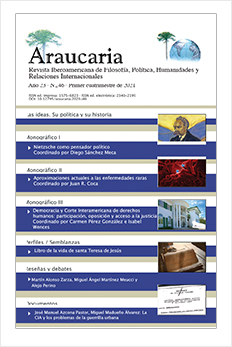The Image of The Inter-American Court of Human Rights as an Agent of Democratic Transformation: A Tool of Self-Validation
DOI:
https://doi.org/10.12795/araucaria.2021.i46.24Palabras clave:
democratic transformation, representative democracy, self-validation, self-referentially, progress, international human rights judiciary, equalityResumen
Este articulo analiza críticamente las premisas y argumentos del proyecto Ius Constitutionale Commune en América Latina que perfilan a la Corte Interamericana de Derechos Humanos como un agente de transformación democrática. El articulo plantea tres críticas en concreto: la imagen de la Corte es una construcción llevada a cabo por los abogados y jueces que adolece de problemas de autorreferencialidad y autovalidación; 2. En la medida que dicha construcción valida la idea de que los abogados y jueces son agentes de transformación, también descarta perspectivas que sitúan a los individuos como los sujetos que lideran la democratización de sus ámbitos locales; 3. el concepto de democracia representativa que fundamenta la imagen de la Corte como agente de transformación democrática es una herramienta de auto-validación de la labor de esta última.
Descargas
Citas
Aspremont, J. D’Aspremont, “Jus Cogens as a Social Construct without Pedigree.” Netherlands Yearbook of International Law 46, (2016): 85–114.
Aspremont, J. D’Aspremont, International Law as a Belief System (Cambridge, 2018).
Altwicker & Diggelmann, T. Altwicker and O. Diggelman, “How Is Progress Constructed in International Legal Scholarship?”, European Journal of International Law 25.2 (2014): 425-44.
Bogdandy, A. v., “Ius Constitutionale Commune en América Latina: Observations on Transformative Constitutionalism”, AJIL Unbound (109): 109–114. doi:10.1017/S2398772300001264.
Bogdandy A. v., E. Ferrer Mac-Gregor, M. Morales Antoniazzi, and F. Piovesan (eds.), Transformative Constitutionalism in Latin America: The Emergence of a New Ius commune (Oxford, 2017).
Cohen and A. Vauchez, “The Social Construction of Law: The European Court of Justice and Its Legal Revolution Revisited”, Annual Review of Law and Social Science 7.1 (2011): 417–31.
Contesse J., “The final word? Constitutional dialogue and the Inter-American Court of Human Rights: A rejoinder to Paolo Carozza and Pablo González Domínguez.” International Journal of Constitutional Law 15(2): 443–446. doi:10.1093/icon/mox036.
Clérico, L. Ronconi and M. Aldao, “Hacia la reconstrucción de las tendencias jurisprudenciales en América Latina y el Caribe en materia de igualdad: sobre la no-discriminación, la no-dominación y la redistribución y el reconocimiento.” Revista Direito GV 9(1) (2013): 115-170. doi:10.1590/S1808-24322013000100006.
Charlesworth H. “International Law: A Discipline of Crisis”, Modern Law Review 65.3 (2002): 377-92.
Daly T. G., The Alchemists: Questioning Our Faith in Courts as Democracy-builders (Cambridge, 2017).
Dulitzky A., “When Afrodescendants Became Tribal Peoples”, UCLA Journal of International Law & Foreign Affairs 15(1) (2010): 29–81.
Frankenberg G., Comparative Law as Critique (Edward Elgar, 2016).
Gargarella R., “The constitutionalization of international law in Latin America. Democracy and rights in Gelman vs. Uruguay.” American Journal of International Law. AJIL unbound 109 (2015): 115-119.
Herrera J. C., “The Right of Cultural Minorities to Binding Consent: Case Study of Judicial Dialogue in the Framework of a Ius Constitutionale Commune en América Latina”, Max Planck Institute for Comparative Public Law & International Law (MPIL) Research Paper No. 201 7-11, 32.
Kennedy, D., A World of Struggle: How Power, Law, and Expertise Shape Global Political Economy (Princeton, 2018). www.jstor.org/stable/j.ctt1wf4cz3 accessed December 13, 2019.
Klabbers, J., “The Emergence of Functionalism in International Institutional Law: Colonial Inspirations”, European Journal of International Law 25.3 (2014): 645-75.
Marks, S. The Riddle of All Constitutions: International Law, Democracy, and the Critique of Ideology (Oxford, 2003).
Meerssche D., “Scholars in Self-estrangement (again): Rethinking the Law of International Organisations”, London Review of International Law 5.3 (2017): 455–80.
Nonet, P. and P. Selznick, Law & Society in Transition: Toward Responsive Law (Transaction, 2001).
Purvis, N., “Critical legal studies in public international law”, Harvard International Law Journal 32(1) (1991): 81-127.
Robinson W., Promoting Polyarchy: Globalization, US intervention, and Hegemony (Cambridge, 1996).
Rodiles, A., “The Great Promise of Comparative Public Law for Latin America: Toward Ius Commune Americanum?”, In A. Roberts et al. (eds), Comparative International Law (Oxford 2018).
Ryan M., “Self-evidence”, Diacritics (1980): 216.
Sihvo, O., “Global Constitutionalism and the Idea of Progress”, Helsinki Law Review, 12(1) (2018): 10-34.
Sinclair, G. F., To Reform the World: International Organizations and the Making of Modern States (Oxford, 2017).
Schaffer, J., Democrats Without Borders: A Critique of Transnational Democracy (Gothenburg, 2008).
Schlag, P. “Normative and Nowhere to Go”, Stanford Law Review, 43.1 (1990): 167–191.
Shklar, J., Legalism: Law, Morals and Political Trials (Harvard, 1986).
Skouteris, T., “The Idea of Progress”, In A. Orford and F. Hoffmann (eds.), The Oxford Handbook of the Theory of International Law (Oxford, 2015).
Skouteris, T., The Notion of Progress in International Law Discourse (Asser 2010).
Veçoso, F., Entre absolutismo de direitos humanos e história contextual: aspectos da experiência da Corte Interamericana de Direitos Humanos (University of Sao Paulo, 2012). Doctoral degree.
Wall, I. R., Human Rights and Constituent Power: Without Power or Warranty (Routledge, 2012).
Wood, E. M., Democracy Against Capitalism: Renewing Historical Materialism. (Cambridge, 1995).
Zaremberg G. and Torres Wong, M., “Participation on the Edge: Prior Consultation and Extractivism in Latin America”, Journal of Politics in Latin America 10.3 (2018): 29-58.
Descargas
Publicado
Cómo citar
Número
Sección
Licencia
Las ediciones impresa y electrónica de esta Revista son editadas por el Secretariado de Publicaciones de la Universidad de Sevilla, siendo necesario citar la procedencia en cualquier reproducción parcial o total.Salvo indicación contraria, todos los contenidos de la edición electrónica se distribuyen bajo una licencia de uso y distribución “Creative Commons Atribución-NoComercial-SinDerivar 4.0 Internacional”








